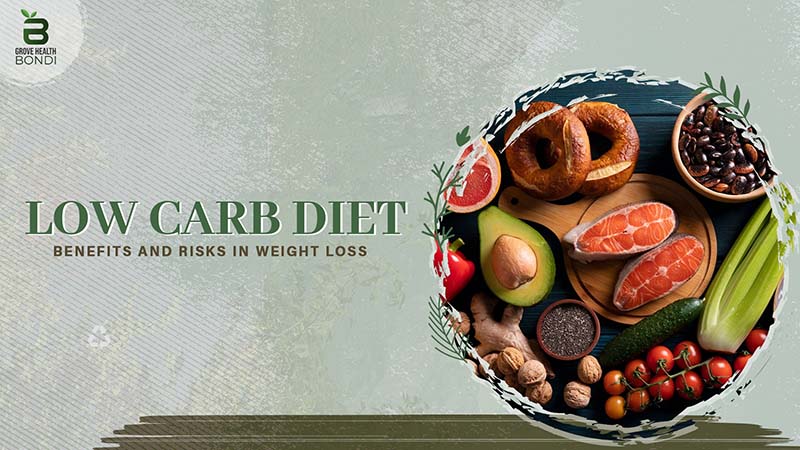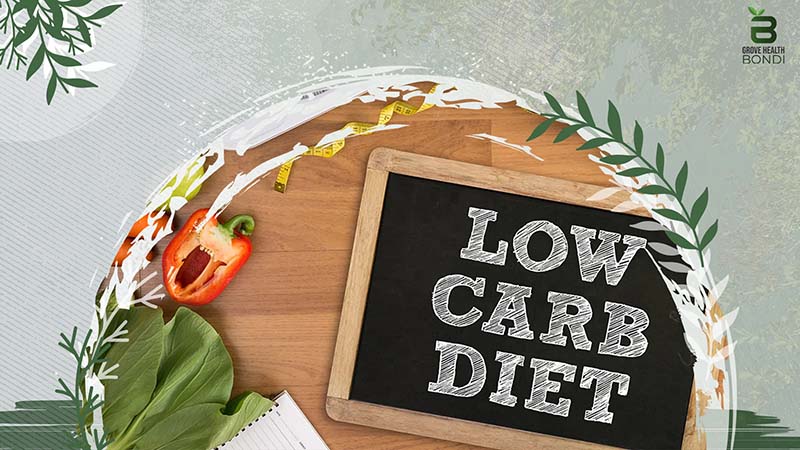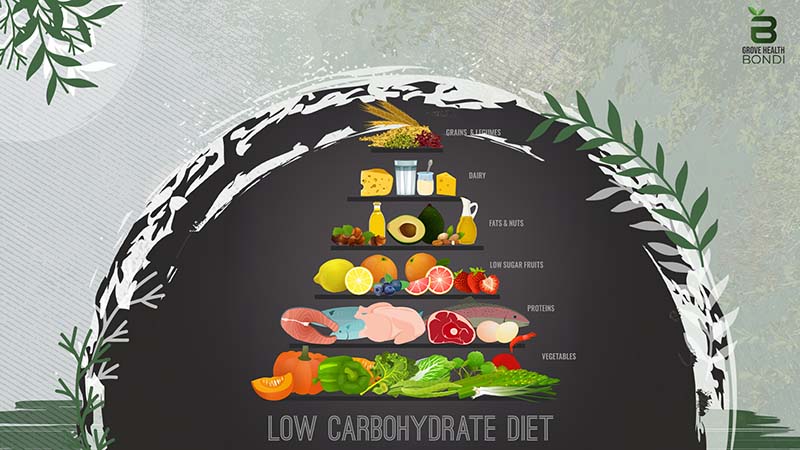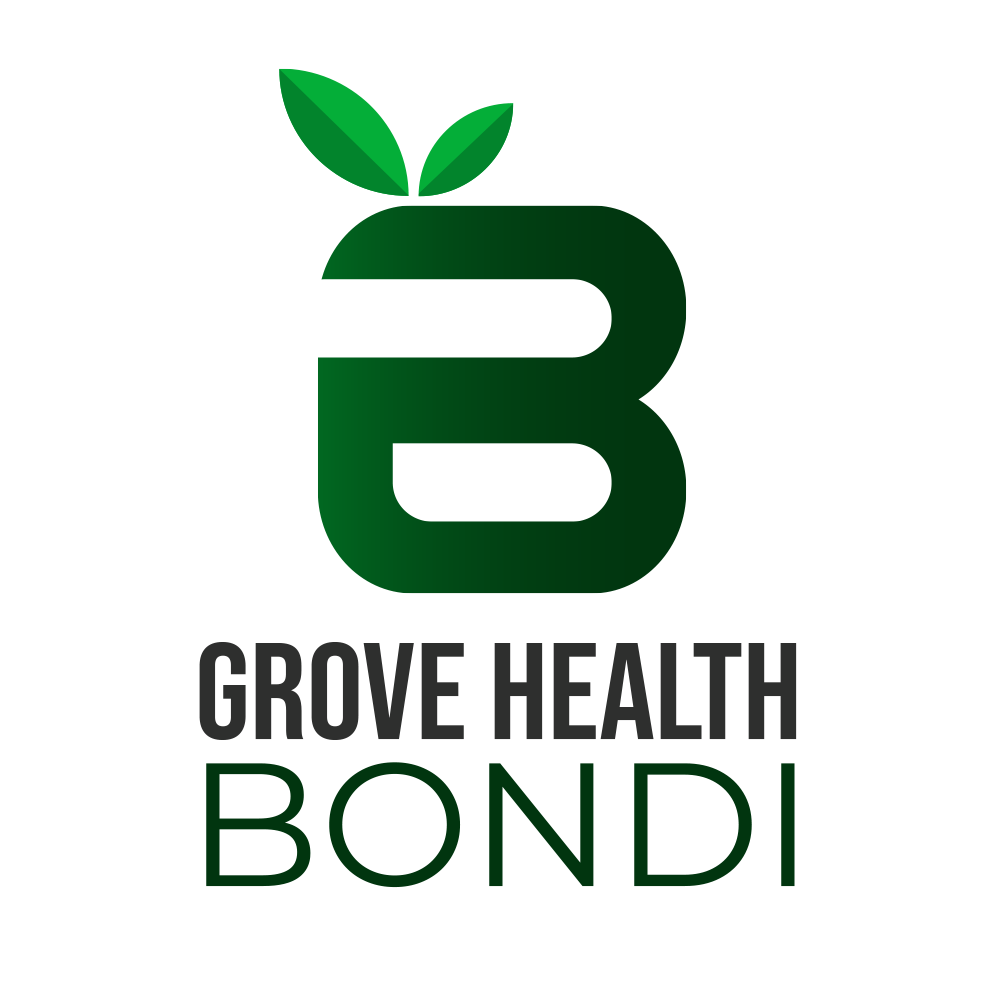Many people today choose the Low Carb diet as an effective weight loss method without the need for strict calorie counting or intense exercise. So, what exactly is a Low Carb diet, and does it have any health risks? Let’s explore this with Grove Health Bondi.

1. What is a Low Carb Diet?
A Low Carb diet is a dietary approach that focuses on significantly reducing the amount of carbohydrates consumed in each meal. Simply put, this diet requires individuals to limit their intake of sugars and starches, instead focusing on consuming proteins and healthy fats. The typical ratio of carbs to protein to fats in daily meals is 2:5:3.
Implementing a Low Carb diet not only helps individuals lose weight and reduce body fat quickly, but it also helps prevent certain diseases such as diabetes, high blood pressure, and digestive disorders.
In addition to the Low Carb diet, the Keto Diet has also gained popularity in recent years. Both diets operate on the principle of reducing carbohydrate intake. However, the Keto diet emphasizes consuming high amounts of healthy fats, which can account for 60-80% of daily energy intake. In contrast, the Low Carb diet focuses more on high-protein foods, allowing for protein to make up more than 50% of daily energy intake.

2. Principles of a Low Carb Diet
The Low Carb diet is a weight loss method that focuses on reducing the intake of carbohydrates (sugars and starches) in daily meals. Here are some fundamental rules of the Low Carb diet.

2.1 Avoid White Carbohydrates (Fast Carbs)
This is the first and one of the most important principles of the Low Carb diet. Foods rich in white carbohydrates, such as rice, noodles, bread, and pastries, contain high amounts of refined carbs.
Consuming these white carbohydrates can lead to rapid weight gain compared to brown carbs like whole grain bread, brown rice, and oatmeal. White carbs have a high glycemic index (GI), which indicates how quickly blood sugar levels rise after eating, leading to faster fat accumulation.
Studies have shown that foods with a high GI, like white carbs, only keep you full for about an hour, whereas brown carbs can keep you satisfied for 2-3 hours. This difference causes those who eat white carbs to feel hungrier sooner and eat more, leading to weight gain.
Additionally, excessive consumption of white carbs is linked to an increase in abdominal fat. Over a five-year study, researchers found a positive correlation between white carb consumption and increased waist circumference.
To avoid belly fat and support weight loss, minimize the intake of white carbs and replace them with healthier alternatives like brown carbs.
When following a Low Carb diet, avoid foods high in white carbs such as white bread, white rice, pasta, cakes, and candy
2.2 Focus on High-Quality Foods
When following a Low Carb diet, replace reduced carbohydrates with high-quality, nutrient-dense foods that are low in sugar, including:
- Good protein sources: chicken breast, chicken thighs, egg whites, beef, pork, fish, legumes, unsweetened dairy products.
- Healthy fats: coconut oil, olive oil, flaxseed oil, cream, butter, chia seeds, almonds.
- Low-sugar vegetables and fruits: asparagus, cabbage, green beans, cauliflower, cucumbers, berries.
Combine these foods to add variety to your daily meals. It’s important to monitor your carbohydrate intake while doing so.
2.3 Avoid High-Calorie Drinks
One crucial principle of the Low Carb diet is to reduce sugar and starch intake. Opt for low-calorie, low-sugar drinks like water, tea, and coffee to help cut sugar and boost fat burning.
If you drink tea or coffee, add as little sugar as possible, or avoid sugar altogether. Consuming too much sugar can lead to sugar addiction, where you crave the sweet taste in your beverages but think you’re just enjoying tea or coffee. This is risky as sugar is a major contributor to obesity worldwide.
Also, avoid sugary drinks like soda, sweetened juices, and stimulants like alcohol and beer.
2.4 Limit Sweet Fruits
Most sweet fruits contain a high amount of fructose. When ingested, fructose converts to glycerol phosphate in the body, which combines with the liver to form triglycerides, contributing to fat accumulation.
3. Benefits of a Low Carb Diet for Health and Fitness
The Low Carb diet offers numerous health benefits, including:

3.1 Effective Weight Loss
One of the most attractive benefits of the Low Carb diet is its effectiveness in weight loss. This diet is often considered a lifesaver for those seeking to lose weight quickly and efficiently in a short period.
Many people struggle to create an effective Low Carb meal plan for weight loss. If you face this challenge, consider personalized meal planning services like those offered by Nutrihome.
3.2 Reduces Blood Fat and Improves Heart Health
Triglycerides are the main contributors to cardiovascular problems. High levels of body fat can lead to clogged arteries, reducing blood flow to the heart and increasing the risk of heart attack.
Research has shown that the Low Carb diet benefits heart health both in the short and long term. By encouraging the consumption of good fats (low in cholesterol) such as fish oil, olive oil, and plant-based oils instead of unhealthy animal fats, the Low Carb diet supports heart health.
3.3 Lowers Risk of Diabetes
The Low Carb diet is one of the most effective methods for stabilizing blood sugar levels and reducing the risk of diabetes.
Since carbohydrates are the primary factor in raising blood sugar levels, controlling carbohydrate intake through a Low Carb diet helps lower blood sugar levels. This, in turn, helps prevent diabetes and other related conditions like heart disease, obesity, and high blood pressure.
3.4 Reduces Hunger and Maintains Energy
One major challenge in maintaining weight is the constant feeling of hunger and food cravings. However, with the Low Carb diet, this is less likely to occur. The diet focuses on high-protein, high-fat foods that keep you feeling full longer.
Protein is a slow-digesting nutrient. When consumed, it reduces the levels of the hunger hormone ghrelin and increases levels of the hormone peptide YY, which makes you feel full. Thus, protein intake helps curb appetite and promotes faster weight loss.
3.5 Enhances Brain Health
While carbohydrates are essential for brain function, many worry that the Low Carb diet may harm brain health. However, this concern is unfounded.
A study published by the National Library of Medicine shows that the Low Carb diet can enhance memory and protect brain health. Additionally, the principles of Low Carb and the state of ketosis (where the body burns fat for energy) are effective in treating epilepsy in children and other serious conditions like Alzheimer’s and stroke.
3.6 Reduces Bloating
Eating too many carbohydrate-rich foods like bread and white rice can cause digestive issues like bloating. The high sugar content can overwhelm the small intestine, causing undigested food to move to the colon, where it is broken down by gut bacteria, producing gas.
The Low Carb diet minimizes carbohydrate intake, reducing bloating and digestive discomfort after meals.
3.7 Improves Exercise Performance
A recent study found that athletes following a Low Carb diet could reduce body fat by up to 70% when combined with high-intensity exercise. In contrast, those on a high-carb diet only saw a 55% reduction in body fat.
The Low Carb diet is also ideal for preventing fatigue during long periods of exercise, enhancing the body’s ability to burn fat during low to moderate-intensity workouts.
3.8 Reduces Negative Effects of Excess Carbohydrates
Many common health issues, such as obesity, type 2 diabetes, cardiovascular diseases, and even cancer, are linked to excess unhealthy carbohydrates.
Fortunately, the Low Carb diet helps prevent these issues by controlling or minimizing the intake of bad carbs through daily meals. This approach significantly reduces or eliminates the harmful effects of unhealthy carbohydrates on the body.
4. Side Effects of the Low Carb Diet
While the Low Carb diet has many health benefits, there are some side effects you should be aware of. Here are a few potential side effects of the Low Carb diet:

4.1 Headaches
Excessive reduction of carbohydrates can lead to headaches, especially in women starting the Low Carb diet. This is because when the body lacks carbs, it enters a state of ketosis to burn fat. This state can cause stress on the brain and fatigue in the body, particularly during the first 7-15 days. To alleviate this, consider adding complex, low-calorie carbs like oats, brown rice, and whole grains.
4.2 Fatigue
During the first few weeks of the Low Carb diet, you might experience fatigue and weakness due to reduced carb intake. This can significantly impact physical activities and daily exercise routines. To combat this, increase your intake of healthy proteins and fats to maintain your energy levels. Drinking a glass of diluted saltwater 30-60 minutes before exercise can also help. Additionally, give your body a few weeks to adapt to the fat-burning state (ketosis).
4.3 Bad Breath
Many people on the Low Carb diet notice a distinct odor in their breath, similar to nail polish remover, due to the presence of acetone. This indicates that your body is burning stored fats, producing ketones. High levels of ketones can cause changes in the mouth, resulting in bad breath. You can manage this by chewing sugar-free gum or drinking green tea.
4.4 Constipation and Diarrhea
Constipation and diarrhea are common side effects for those new to the Low Carb diet. Switching to a new diet can disrupt your digestive system. Constipation can occur from excessive protein intake, while diarrhea can result from too much fat. To alleviate these issues, if constipated, increase your fiber intake from vegetables, fruits, and drink plenty of water. If experiencing diarrhea, reduce fat intake, drink more water, and replenish electrolytes with drinks like coconut water.
4.5 Hair Loss
Temporary hair loss is a common phenomenon when the body undergoes significant changes in diet or lifestyle, particularly in women. This typically starts 3-6 months after beginning the Low Carb diet. However, this is usually temporary, and hair will regrow within a few months. For those with long hair, it may take a year or more to return to its original length.
In addition to the above side effects, the Low Carb diet can cause nutrient deficiencies, muscle cramps, liver and kidney issues, or weight gain if you focus solely on protein and fats while neglecting vitamins and minerals.
To minimize side effects, gradually reduce carbohydrate intake to allow your body to adjust. Before starting a Low Carb diet, consult with a doctor or nutritionist to ensure it’s suitable for your health condition.
5. Who Should Not Follow a Low Carb Diet?
While the Low Carb diet offers numerous benefits for weight loss and overall health, it is not suitable for everyone. The following individuals should not follow a Low Carb diet:
- People under severe stress or experiencing frequent insomnia: The Low Carb diet may exacerbate these conditions.
- Pregnant and breastfeeding women: This diet may not provide the necessary nutrients required during these critical periods.
- Individuals with certain medical conditions: Those with heart disease, diabetes, kidney stones, osteoporosis, high cholesterol, or thyroid problems should avoid the Low Carb diet due to potential adverse effects.
Although the Low Carb diet might not be appropriate for these groups, they can consider the Eat Clean diet. Unlike the Low Carb diet, the Eat Clean diet is not a strict regimen with stringent nutritional rules. Instead, it is a health-focused eating style that emphasizes consuming fresh, wholesome foods, making it suitable for individuals with heart disease or diabetes.

6. Tips for a Healthy Low Carb Diet
To follow a Low Carb diet healthily, consider these tips:
6.1 Don’t Cut Out Carbs Completely
Understand that the Low Carb diet does not require you to eliminate all carbohydrates from your daily meals. Instead, gradually reduce the intake of unhealthy carbs found in sugary drinks, bread, and pastries. Replace them with healthy carbs like vegetables, fruits, sweet potatoes, and whole grains. This gradual reduction helps your body adapt and prevents sudden drops in blood sugar levels.
6.2 Increase Protein and Moderate Fat Intake
The Low Carb diet recommends consuming plenty of protein, making up at least 50% of your total daily energy intake, and ensuring sufficient fat intake, at least 20% of your daily energy intake. High protein intake provides an energy source to replace the reduced carbs, keeps you feeling full longer, and supports muscle retention. Meanwhile, fats enhance the taste of food, aid in bowel movements, and support brain and heart health.
6.3 Supplement Other Nutrients
While the Low Carb diet focuses on protein, it’s essential to supplement your diet with other crucial nutrients such as fiber, vitamins, and minerals to maintain balance and prevent digestive issues. You can obtain fiber and vitamins from various fruits and vegetables like cauliflower and cucumbers. Additionally, it’s important to drink 2-2.5 liters of water daily to support metabolism and overall health.
6.4 Follow Low Carb Diet for a Limited Time
Long-term adherence to the Low Carb diet has been reported to be associated with serious health complications such as arrhythmias, sudden cardiac death, osteoporosis, kidney damage, increased cancer risk, reduced physical activity, and lipid disorders. Therefore, once you reach your desired weight with the Low Carb diet, transition to a balanced diet and combine it with suitable exercise routines to maintain your weight.
7. What to Eat on a Low Carb Diet?
7.1 Low-Carb Foods to Eat
- Meats: All kinds of red meat, chicken, beef, pork, bacon, ham, and sausages.
- Fish and Seafood: Salmon, sardines, mackerel, tuna, shrimp, squid, etc.
- Eggs: Both yolks and whites are beneficial; yolks contain good fats (low in cholesterol) and whites are rich in protein.
- Healthy Fats: Olive oil, coconut oil, fish oil, vegetable oils, etc.
- Non-Starchy Vegetables: Spinach, broccoli, cauliflower, etc.
- Slow-Digesting Starchy Vegetables: Sweet potatoes, potatoes, yams, etc.
- Low-Carb Fruits: Oranges, blueberries, strawberries, raspberries, etc.
- Nuts and Seeds: Almonds, walnuts, sunflower seeds, chia seeds, flaxseeds, etc.
- Dairy Products: Cheese, Greek yogurt, butter, etc.
- Whole Grains: Oats, brown rice, quinoa, etc.
- Legumes: Green beans, soybeans, peas, black beans, red beans, etc.

7.2 Foods to Avoid
- High-Carb Fruits: Pineapple, mango, banana, etc.
- High-Carb Dairy Products: Whole milk, full-fat yogurt, etc.
- Other Foods: Dark chocolate, dry wine, etc.
Ripe mangoes, bananas, and pineapples have high levels of fast-absorbing sugars, so it’s best to limit these fruits when following a Low Carb diet.
8. 7-Day Low Carb Diet Meal Plan to Shed Fat
Depending on individual needs and health conditions, Low Carb diet plans can vary. Below is a 7-day Low Carb diet meal plan for reference:

8.1 Day 1 Low Carb Meal Plan
Total carbs for the day: 62g
- Breakfast: 2 slices of bread, half an avocado (Total carbs: 36.5g)
- Lunch: 100g grilled chicken, 1 Laughing Cow cheese wedge (Total carbs: 17g)
- Dinner: Hamburger with a slice of cheese, 100g cooked broccoli (Total carbs: 8.5g)
8.2 Day 2 Low Carb Meal Plan
Total carbs for the day: 40.6g
- Breakfast: 1 cup of Greek yogurt with blueberries and almonds (Total carbs: 19.4g)
- Lunch: 100g grilled ribs with sautéed green beans (Total carbs: 13.5g)
- Dinner: 100g grilled salmon with cooked asparagus and cauliflower (Total carbs: 7.7g)
8.3 Day 3 Low Carb Meal Plan
Total carbs for the day: 54.7g
- Breakfast: 2 boiled eggs and 1 tomato (Total carbs: 19g)
- Lunch: Shrimp salad with lettuce, eggs, and tomatoes (Total carbs: 10.5g)
- Dinner: 100g grilled chicken with Brussels sprouts and quinoa (Total carbs: 25.2g)
8.4 Day 4 Low Carb Meal Plan
Total carbs for the day: 50g
- Breakfast: Pudding with Greek yogurt and raspberries (Total carbs: 27.1g)
- Lunch: 100g fried tofu, cauliflower salad with mixed greens (Total carbs: 14.9g)
- Dinner: 100g ground beef stuffed with bell peppers, 1 slice of cheese (Total carbs: 8g)
8.5 Day 5 Low Carb Meal Plan
Total carbs for the day: 56.9g
- Breakfast: Banana and strawberry smoothie (Total carbs: 26.9g)
- Lunch: 100g grilled lamb chops with Greek salad (Total carbs: 8g)
- Dinner: 200g tuna salad with lettuce (Total carbs: 22g)
8.6 Day 6 Low Carb Meal Plan
Total carbs for the day: 48.4g
- Breakfast: 2 fried eggs with spinach salad (Total carbs: 3g)
- Lunch: 100g steak and cooked broccoli (Total carbs: 20g)
- Dinner: 100g turkey meatballs with sautéed zucchini (Total carbs: 25.4g)
8.7 Day 7 Low Carb Meal Plan
Total carbs for the day: 75g
- Breakfast: 2 slices of bacon, 2 boiled eggs (Total carbs: 16.3g)
- Lunch: 100g grilled chicken with cooked kale (Total carbs: 28.4g)
- Dinner: Burrito with cauliflower salad, black beans, and tomatoes (Total carbs: 30.3g)
9. Conclusion
The Low Carb diet is an effective method for shedding excess fat and achieving a toned physique without strict dietary restrictions. Besides its weight loss benefits, the Low Carb diet also offers numerous health advantages, such as blood sugar control and improved heart health. However, to maximize the effectiveness of a Low Carb diet, it must be followed correctly and combined with appropriate exercise routines and a healthy lifestyle. This approach will help ensure that your body remains healthy and well-balanced while you achieve your weight loss goals.

